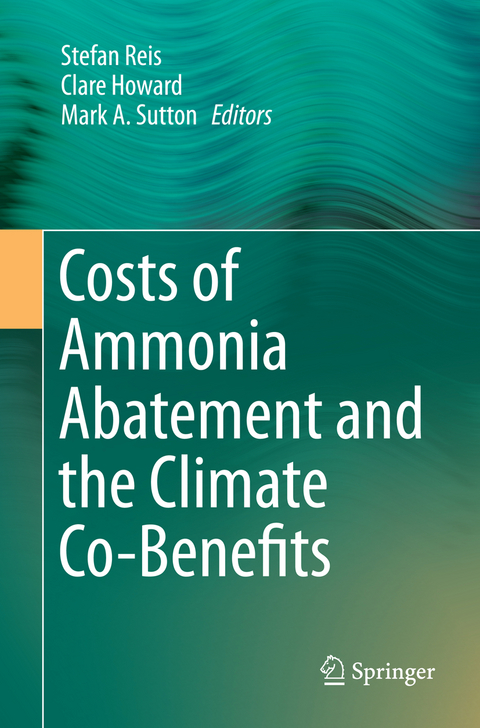
Costs of Ammonia Abatement and the Climate Co-Benefits
Seiten
2016
|
Softcover reprint of the original 1st ed. 2015
Springer (Verlag)
978-94-024-0390-9 (ISBN)
Springer (Verlag)
978-94-024-0390-9 (ISBN)
This book examines the costs involved in reducing ammonia emissions from agricultural practices as well as the potential benefits for climate change mitigation. It features contributions by experts in agricultural production processes, producers of agricultural equipment and service providers as well as scientists who assess the issue from an European perspective.
Coverage examines all agricultural production stages starting from animal feed and housing, including the storage and application of liquid and solid manure and of mineral fertilizer. In addition, the book looks at the relationship between ammonia control and greenhouse gas emissions and details the GAINS (Greenhouse Gas and Air Pollution Interactions and Synergies) model for estimating costs and reducing ammonia emissions from agriculture. Examples and case studies from select European countries, including Italy, Switzerland, Russia, Ireland, and Spain, provide readers with detailed studies of ammonia abatement costs and the effectiveness of implementing control measures under different conditions. This book is the result of an Expert Workshop held under the auspices of the UNECE Convention on Long-range Transboundary Air Pollution (CLRTAP) and organised by the Task Force on Reactive Nitrogen (TFRN). The findings of this workshop have informed the development of documents supporting the revision of the Gothenburg Protocol and provided researchers and practitioners with vital new data. Bringing together a wealth of key information on the costs of ammonia abatement and the climate co-benefits, this monograph provides readers with deep insight into this complex issue.
Coverage examines all agricultural production stages starting from animal feed and housing, including the storage and application of liquid and solid manure and of mineral fertilizer. In addition, the book looks at the relationship between ammonia control and greenhouse gas emissions and details the GAINS (Greenhouse Gas and Air Pollution Interactions and Synergies) model for estimating costs and reducing ammonia emissions from agriculture. Examples and case studies from select European countries, including Italy, Switzerland, Russia, Ireland, and Spain, provide readers with detailed studies of ammonia abatement costs and the effectiveness of implementing control measures under different conditions. This book is the result of an Expert Workshop held under the auspices of the UNECE Convention on Long-range Transboundary Air Pollution (CLRTAP) and organised by the Task Force on Reactive Nitrogen (TFRN). The findings of this workshop have informed the development of documents supporting the revision of the Gothenburg Protocol and provided researchers and practitioners with vital new data. Bringing together a wealth of key information on the costs of ammonia abatement and the climate co-benefits, this monograph provides readers with deep insight into this complex issue.
1. Overview, aims and scope.- 2. Economic costs of nitrogen management in agriculture.- 3. Economics of low nitrogen feeding strategies.- 4. Ammonia abatement by animal housing techniques.- 5. Ammonia abatement with manure storage and processing techniques.- 6. Cost of ammonia emission abatement from manure spreading and fertilizer application.- 7. Co-benefits and trade-offs of between greenhouse gas and air pollutant emissions for measures reducing ammonia emissions and implications for costing.- 8. Country case studies.- 9. Estimating costs and potential for reduction of ammonia emissions from agriculture in the GAINS model.- 10. Costs of ammonia abatement: summary, conclusions and policy context.
| Erscheint lt. Verlag | 23.10.2016 |
|---|---|
| Zusatzinfo | 31 Illustrations, color; 21 Illustrations, black and white; XIV, 284 p. 52 illus., 31 illus. in color. |
| Verlagsort | Dordrecht |
| Sprache | englisch |
| Maße | 155 x 235 mm |
| Themenwelt | Naturwissenschaften ► Biologie ► Ökologie / Naturschutz |
| Naturwissenschaften ► Geowissenschaften ► Geologie | |
| Naturwissenschaften ► Geowissenschaften ► Meteorologie / Klimatologie | |
| Technik | |
| Schlagworte | Air pollutant emissions • Ammonia abatement • Ammonia emissions • Benefits of air pollution • Benefits of greenhouse gas mitigation • Cost of ammonia abatement • Greenhouse Gas Emissions • Manure management • Nitrogen feeding strategies • Nitrogen in agriculture • Nitrogen management |
| ISBN-10 | 94-024-0390-6 / 9402403906 |
| ISBN-13 | 978-94-024-0390-9 / 9789402403909 |
| Zustand | Neuware |
| Haben Sie eine Frage zum Produkt? |
Mehr entdecken
aus dem Bereich
aus dem Bereich


